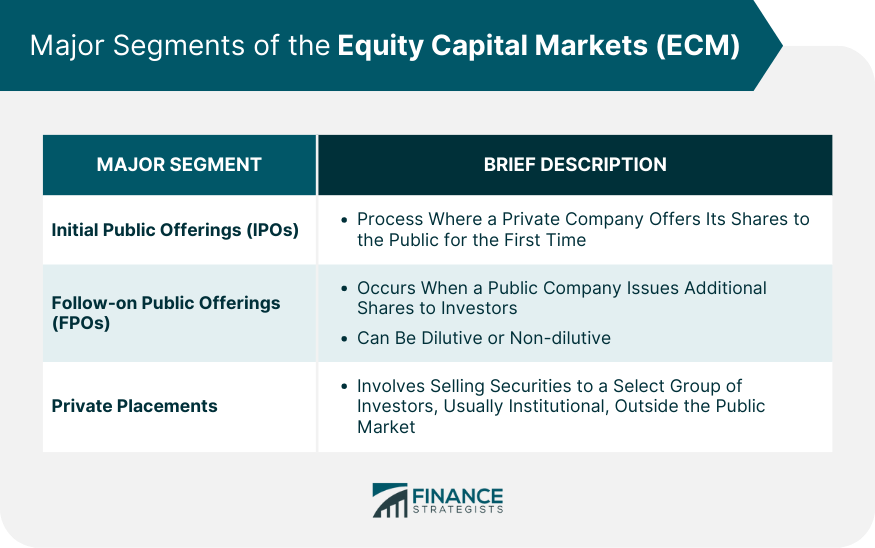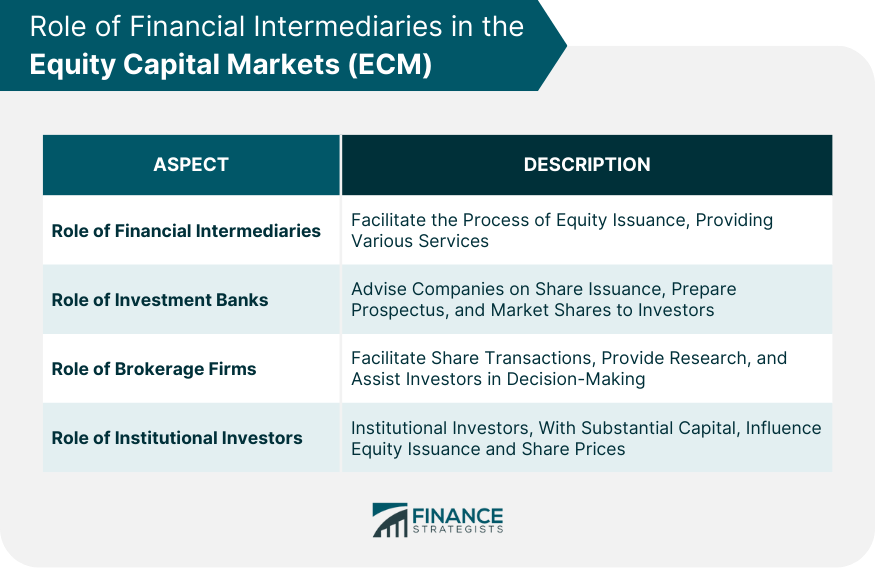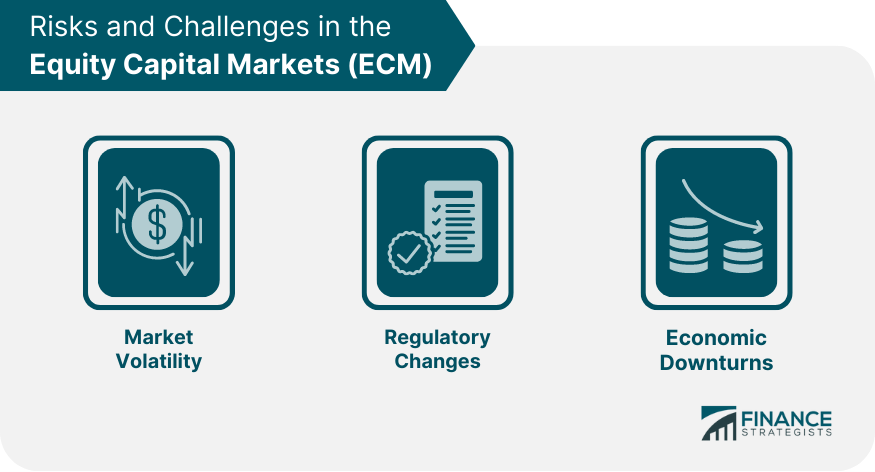Equity Capital Market refers to a specific segment of the financial market where companies interact with investors to raise capital in exchange for equity, primarily in the form of common and preferred shares. This market includes all venues and activities where the issuance and trading of equity securities occur, such as initial public offerings (IPOs), secondary market offerings, private placements, and transactions involving convertible securities. The ECM serves as a crucial conduit for capital mobilization, enabling businesses to fund expansion, manage debt, and finance various corporate activities. Key participants in the ECM include issuing companies, investment banks, brokerage firms, and institutional and retail investors. In the financial world, the ECM plays a crucial role in facilitating the transfer of capital from investors to businesses. It provides investors with opportunities to share in the profits and growth of the businesses they invest in, offering a potential return on investment. Companies raise equity capital in the ECM by issuing shares to investors. This process typically involves an IPO, where shares of a company are sold to the general public for the first time. Alternatively, companies may issue additional shares in Follow-on Public Offerings (FPOs) or sell shares to select investors through private placements. Equity securities primarily consist of common stocks and preferred shares. Common stocks offer ownership rights and voting privileges in a company, while preferred shares grant a higher claim on earnings and assets but typically do not come with voting rights. The process of issuing equity securities involves several steps. First, the issuing company works with an investment bank to prepare a prospectus that details the company's financial situation and the terms of the share issuance. After regulatory approval, the shares are priced and sold to investors, with the proceeds going to the issuing company. An IPO is a significant event in a company's lifecycle. It's when a company offers its shares to the public for the first time. This process transforms a private company into a public one, opening up a broad pool of potential investors. The IPO process involves several steps and can take several months to complete. It begins with the selection of an investment bank, continues with due diligence and the creation of a prospectus, and culminates in a roadshow where the issuing company markets its shares to potential investors. The process concludes with the pricing and issuance of the shares on the stock exchange. The ECM plays a vital role in IPOs, providing the infrastructure and participants needed to facilitate the share issuance. Investment banks, as part of the ECM, assist with the IPO process, while investors in the ECM provide the capital that the issuing company seeks. An FPO is when a public company issues additional shares to investors. These offerings can be dilutive, where new shares are created, or non-dilutive, where existing private shares are sold to the public. While IPOs and FPOs both involve the issuance of shares to the public, they occur at different stages in a company's lifecycle and have distinct implications for existing shareholders. IPOs transform a private company into a public one, while FPOs involve a public company issuing additional shares. FPOs can dilute the ownership of existing shareholders, while IPOs do not, since there are no public shareholders before the IPO. In FPOs, the ECM enables public companies to raise additional capital. It provides the platform for issuing additional shares and connects the issuing company with potential investors. Private placements involve selling securities to a select group of investors rather than to the public at large. These investors are usually institutional investors like mutual funds, pension funds, and private equity firms. Private placements offer several advantages. They are generally faster and less expensive than public offerings since they don't require regulatory approval. However, they also limit the potential investor base and may require higher discounts due to the lack of liquidity. While private placements occur outside the public ECM, the ECM still plays a role in these transactions. For example, investment banks may assist with finding potential investors, and institutional investors participating in private placements are part of the broader ECM. Investment banks play a critical role in the ECM. They assist companies in issuing shares, which includes providing advice on the timing and pricing of the issuance, preparing the prospectus, and marketing the shares to potential investors. Brokerage firms also play a key role in the ECM. They act as intermediaries between investors and the issuing company, facilitating the purchase and sale of shares. They also provide research and advice to investors, helping them make informed investment decisions. Institutional investors, such as mutual funds, pension funds, and hedge funds, are major participants in the ECM. They often have large amounts of capital to invest and can therefore take significant positions in companies. Their investment decisions can influence the success of equity issuance and the price of a company's shares. Market volatility can pose challenges for the ECM. High volatility can make it more difficult for companies to issue shares, as investors may be wary of investing in a volatile market. Conversely, low volatility can lead to complacency and excessive risk-taking. Regulatory changes can also impact the ECM. Changes in securities regulation can alter the process and costs of issuing shares, affecting both issuing companies and investors. Economic downturns can pose significant challenges for the ECM. During downturns, companies may struggle to raise capital as investors become more risk-averse. This can lead to reduced capital formation and slower economic growth. The Equity Capital Market (ECM) serves as a vital conduit for capital transfer from investors to companies through the issuance of equity securities. This complex system offers an intricate understanding of financial mechanics involving the raising of equity capital, the types of equity securities such as stocks and preferred shares, and the detailed process of issuing these securities. It further encapsulates major segments, including Initial Public Offerings, Follow-on Public Offerings, and private placements. Each segment plays a unique role within the ECM, providing varied avenues for companies to procure funding. Thus, the ECM remains an essential part of our financial ecosystem, facilitating economic growth and business innovation. Understanding its mechanisms and segments is crucial for both investors and companies to successfully navigate the financial landscape.Definition of Equity Capital Market (ECM)
Understanding the Mechanics of ECM
Major Segments of the ECM
Initial Public Offerings (IPOs)
Overview of IPOs
Process and Timeline of an IPO
Role of the ECM in IPOs
Follow-on Public Offerings (FPOs)
Overview of FPOs
Differences Between FPOs and IPOs
Role of the ECM in FPOs
Private Placements
Overview of Private Placements
Advantages and Disadvantages of Private Placements
Role of the ECM in Private Placements

Role of Financial Intermediaries in the ECM
Role of Investment Banks
Role of Brokerage Firms
Role of Institutional Investors

Risks and Challenges in the ECM
Market Volatility
Regulatory Changes
Economic Downturns

Conclusion
Equity Capital Market (ECM) FAQs
The ECM plays a significant role in the financial world by facilitating the transfer of capital from investors to businesses. This capital mobilization is essential for companies to fund operations, drive innovation, and facilitate expansion. It also provides investment opportunities to investors, who can potentially share in the profits and growth of businesses.
The key types of equity securities in the ECM are common stocks and preferred shares. Common stocks provide ownership rights and voting privileges in a company, while preferred shares offer a higher claim on earnings and assets but usually do not come with voting rights.
Market volatility can pose challenges for the ECM. High volatility can make it more difficult for companies to issue shares, as investors might be wary of investing in a volatile market. Conversely, low volatility can lead to complacency and excessive risk-taking.
Technology is making significant impacts on the ECM. Online trading platforms and robo-advisors are making equity investments more accessible to the public. Additionally, emerging technologies like blockchain hold the potential to revolutionize the ECM by offering more efficient and transparent methods for issuing and trading equity securities.
Market volatility hampers share issuance due to investor wariness or excessive risk-taking in low volatility. Regulatory changes affect ECM by altering share issuance processes and costs, impacting companies and investors. ECM challenges during economic downturns: reduced capital formation and slower growth due to companies struggling to raise capital amidst investor risk aversion.
True Tamplin is a published author, public speaker, CEO of UpDigital, and founder of Finance Strategists.
True is a Certified Educator in Personal Finance (CEPF®), author of The Handy Financial Ratios Guide, a member of the Society for Advancing Business Editing and Writing, contributes to his financial education site, Finance Strategists, and has spoken to various financial communities such as the CFA Institute, as well as university students like his Alma mater, Biola University, where he received a bachelor of science in business and data analytics.
To learn more about True, visit his personal website or view his author profiles on Amazon, Nasdaq and Forbes.















